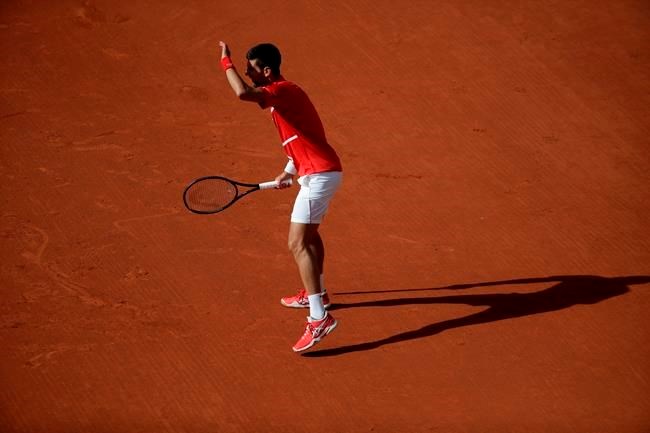PARIS — At the mere mention of Novak Djokovic’s name, at the mere thought of sharing a court with a 17-time Grand Slam champion and the French Open’s No. 1-seeded man, Daniel Elahi Galan broke into a wide smile Thursday.
He used these phrases: “really, really excited” and “really, really happy” and “really, really special.”
Galan is, after all, ranked 153rd and never had won so much as one main-draw match at any major tournament until this week. Making this run to the third round even more improbable: The 24-year-old from Colombia lost in qualifying at Roland Garros and only got into the bracket when other men withdrew from the field.
So, sure, it was a big deal for Galan to beat Tennys Sandgren 6-2, 6-2, 6-3 on Thursday. And, to be sure, a bigger deal to contemplate Saturday, when he will face Djokovic, who has dropped a total of 10 games through two matches so far after overwhelming Ricardas Berankis 6-1, 6-2, 6-2 — and is someone Galan has spotted in the locker room but never spoken to.
It’s the sort of David vs. Goliath matchup that happens often in tennis but is in particular abundance this year in Paris.
Galan is one of nine men ranked outside the top 100 into the third round, equaling the most at any Grand Slam tournament in more than a quarter-century (Wimbledon in 1994); the last time there were as many as nine at Roland Garros was 1985.
There were some unfair-on-paper matchups established Thursday by the women, too.
Australian Open champion Sofia Kenin, who is seeded fourth, will face 105th-ranked qualifier Irina Bara. Two-time Wimbledon winner Petra Kvitova next meets 100th-ranked Canadian teen Leylah Fernandez. Jelena Ostapenko, the 2017 French Open champ, plays 87th-ranked Paula Badosa, who arrived in Paris with a 1-5 Grand Slam record.
“I have a very complex game. I can do many things on court,” said Bara, who is making her Grand Slam debut, “and I hope I will bother her with that.”
Maybe all of the success for those who haven’t done it before is due to this being as unusual a French Open as there’s ever been: shifted from May-June to September-October because of the coronavirus pandemic; from its position deep in the European clay-court circuit to two weeks after the hard-court U.S. Open’s conclusion; played amid autumn’s cold temperatures and rain, although the sun and blue sky made appearances Thursday; just 1,000 spectators allowed on-site each day.
Whatever the case, it’s instructive to remember that occasionally, of course, the stone finds its mark.
Which perhaps is why this was Galan’s philosophy as he looked ahead: “Just try to win. Just give it all you have. And that’s it. At the end of the day, it’s just another match.”
So the obvious question: How do you, as the owner of two career Grand Slam match victories, maintain sufficient self-belief and hope ahead of facing Djokovic, whose 292 wins at majors include 70 at the French Open alone?
“Well,” came Galan’s reply, “I was wondering that, to be honest.”
And then he launched into a story about how he was “really, really nervous” before playing former top 10-member David Goffin in the Davis Cup Finals last November.
“He is Goffin, a guy you see on TV all the time. And I just went on the court and I was just expecting him to play unbelievable and maybe he will beat me so easy,” Galan recalled. “But at the end of the day, they are, like, human. They also make mistakes. And also they get mad. They are also trying the best they can. And that’s it.”
Which sounded inspiring and meaningful ... until a quick inspection of the result revealed that he lost to Goffin.
At least Galan has this going for him: For as much as he has been able to study Djokovic over the years — “A lot; a lot; he's always on TV; always on the
“I don’t know much about him, to be honest. I have never seen him play, so I’ll have to obviously look at his matches, the videos, and try to prepare myself with my team,” said Djokovic, who won the French Open in 2016 to complete his career Grand Slam.
“He doesn’t have much to lose," said Djokovic, who does not lose too much, 33-1 thus far in 2020. "It’s always dangerous facing opponents you never faced before. On the big stadium, they can really relax and play their best tennis of their lives. Or it can go a different way. I have to be alert and prepare myself well.”
The 66th-ranked Berankis, now 0-3 against Djokovic, was asked what advice he would offer Galan.
Instead of discussing any strategic tips, Berankis mentioned mindset.
“With such a great, huge player, you know, ATP No. 1, having crazy amount of Grand Slams in his pocket, ATP tournaments — like one of the best ever — the advice would be not to play the results that he has. Just play the player who is on the court,” Berankis said. “From my own experience ... the most important is how you can perform during this day, not what happened in last 10, 15 years with your opponent, you know? So, yeah, (don’t) panic. Play your game. And see how it goes.”
___
AP Tennis Writer Fendrich reported from Washington; AP Sports Writer Pugmire reported from Paris.
___
More AP tennis: https://apnews.com/apf-Tennis and https://twitter.com/AP_Sports
Howard Fendrich And Jerome Pugmire, The Associated Press


